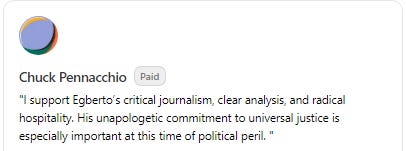An American got a pleasant healthcare surprise in Thailand when she got sick.
An American traveler in Thailand experiences unexpectedly affordable and efficient healthcare, highlighting stark contrasts with the expensive U.S. system and emphasizing the need for care.
A quick but important note before reading this prescient article
Effective today, we have 9.99 thousand followers and 104 supporting (paid) subscribers. WE NEED HUNDREDS MORE, especially in this political climate. Misinformation funded by the deep pockets of our Oligarchy floods the internet. We are using all our platforms on-air, online, and in publications to counter that. We ask that you invest the equivalent of less than a coffee to ensure we can keep doing this. Please invest in a Democracy that serves all of us by becoming a paid subscriber. It comes with many benefits.
American Healthcare Surprise in Thailand.
A young American woman, Mira, traveling in Thailand, found herself grappling with a health crisis. As she narrated her story on TikTok, her experience highlighted the stark contrast between the healthcare systems in the United States and Thailand. Her account not only underscores the inefficiencies and exorbitant costs of American healthcare but also challenges the perception that the U.S. provides the best healthcare in the world.
Mira found it eye-opening to see how healthcare operates in other countries. Her authentic experience serves as a powerful testament to the reality of healthcare systems outside the U.S. Her journey from sickness to recovery in a foreign land offers a compelling narrative on the disparities in healthcare access and affordability.
The Healthcare Experience in Thailand
Mira began her video by explaining her symptoms—chills, cold sweats, and eventually severe vomiting, which left her unable to keep down any solid food or liquids. Desperation drove her to seek medical help at a hospital in the middle of the night, a daunting task in an unfamiliar country. However, contrary to her fears, her experience at the Bangkok Hospital was surprisingly positive.
Upon arrival, she was directed to the fourth floor designated for international patients, indicating a level of organization and consideration for foreigners often lacking in the U.S. healthcare system. She underwent several tests, including a COVID-19 test, a strep throat test, and another unspecified test, all of which returned negative results. The thoroughness of her examination, coupled with the efficiency of the hospital staff, was commendable.
Cost of Healthcare: Thailand vs. the United States
The most striking part of her story was the cost of her medical treatment. For all the tests, a physical evaluation, and the prescribed medications, she was charged a mere 4,132 baht, approximately $113 USD. This starkly contrasts the exorbitant fees similar services would incur in the United States. She estimated that the same level of care in the U.S. could quickly amount to $10,000 to $20,000, not including the cost of medications, which she would have had to purchase separately.
This stark disparity highlights a fundamental issue with the U.S. healthcare system: affordability. In the U.S., medical bills can lead to financial ruin for many individuals, even those with insurance. Her account resonates with countless Americans who have faced similar financial burdens due to medical expenses.
A Broader Perspective on Healthcare Systems
Her story sheds light on the broader implications of healthcare accessibility and affordability. The U.S. prides itself on being a medical innovation and technology leader, yet it fails to provide equitable healthcare to all its citizens. The high cost of medical care in the U.S. often deters people from seeking necessary treatment, exacerbating health issues and leading to more severe outcomes.
In contrast, countries like Thailand prioritize affordable healthcare, ensuring that even international visitors can access quality medical services without incurring insurmountable debts. This approach reflects a fundamental difference in how healthcare is valued and provided. While the U.S. healthcare system is driven by profit, many other countries view healthcare as a basic human right.
The Need for Healthcare Reform in the U.S.
The young woman’s experience serves as a poignant reminder of the urgent need for healthcare reform in the United States. It calls into question the current system’s ability to meet the needs of its citizens and highlights the benefits of a more inclusive and affordable healthcare model. Progressive voices have long advocated for a shift towards a healthcare system that prioritizes people over profits, and her story adds a personal dimension to this ongoing debate.
The Role of Capitalism in Healthcare
One cannot discuss healthcare in the U.S. without addressing the role of capitalism. The profit-driven nature of the American healthcare system means that many people are left behind, unable to afford the care they need. This starkly contrasts with systems in other countries where healthcare is considered a public good, and profit margins do not dictate the quality or accessibility of care.
The young woman’s TikTok video is a testament to the benefits of a healthcare system that values human life over financial gain. Her relief at the affordability and efficiency of Thai healthcare is palpable and serves as a powerful critique of the American system. It is a call to action for policymakers to reconsider the U.S. healthcare system’s priorities and strive for a model that ensures access and affordability for all.
Conclusion
Mira’s experience in Thailand offers a compelling narrative on healthcare access and affordability disparities between the U.S. and other countries. Her story underscores the urgent need for reform in the American healthcare system, highlighting the benefits of a more inclusive and affordable model. As more Americans become aware of these disparities, the call for change will grow louder. Her journey serves as a reminder that healthcare is a fundamental human right, and it is time for the U.S. to recognize and act upon this truth. It is time for Medicare for All.
You can refer to reputable sources like The Commonwealth Fund and The World Health Organization for further reading on the differences between healthcare systems and the need for reform. These sources provide comprehensive analyses and data highlighting the benefits of more equitable healthcare systems worldwide.
Can we count on you to help us reach our goal of 100 new paid subscriptions by month’s end?
The other side has big donors and everyday citizens who invest heavily in platforms that lie and misinform. All we have is you. So, please invest in our media outlet by clicking the subscribe button below to become a paid subscriber. You won’t miss that coffee, but it will make a difference in our politics as we spread the truth about our policies and progressive politics. All paid subscribers get to read my five books on this platform and all subsequent books I write. They will also be privy to subsequent incentives.








Egberto, thanks for this story about an American's enviable experience of healthcare in Thailand. Please, when you write such excellent stuff, remind readers that universal healthcare legislation sits on the desk of every Congress member. Extra points if you include a link to take action. Thank you!